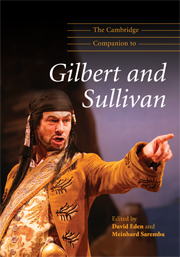Book contents
- Frontmatter
- Part I Background
- Part II Focus
- Part III Reception
- 11 Topsy-Turvy: a personal journey
- 12 Amateur tenors and choruses in public: the amateur scene
- 13 Champions and aficionados: amateur and listener experiences of the Savoy operas in performance
- 14 ‘How great thy charm, thy sway how excellent!’ Tracing Gilbert and Sullivan's legacy in the American musical
- 15 ‘See how the Fates their gifts allot’: the reception of productions and translations in continental Europe
- Part IV Into the twenty-first century
- Appendix 1 Who wrote the overtures?
- Appendix 2 Stage and choral works by Arthur Sullivan and W. S. Gilbert
- Appendix 3 Modern editions of works by Arthur Sullivan and W. S. Gilbert
- Appendix 4 Sullivan's archetypes of English opera
- Notes
- Bibliography and further reading
- Index
- Plate section
11 - Topsy-Turvy: a personal journey
from Part III - Reception
Published online by Cambridge University Press: 28 September 2011
- Frontmatter
- Part I Background
- Part II Focus
- Part III Reception
- 11 Topsy-Turvy: a personal journey
- 12 Amateur tenors and choruses in public: the amateur scene
- 13 Champions and aficionados: amateur and listener experiences of the Savoy operas in performance
- 14 ‘How great thy charm, thy sway how excellent!’ Tracing Gilbert and Sullivan's legacy in the American musical
- 15 ‘See how the Fates their gifts allot’: the reception of productions and translations in continental Europe
- Part IV Into the twenty-first century
- Appendix 1 Who wrote the overtures?
- Appendix 2 Stage and choral works by Arthur Sullivan and W. S. Gilbert
- Appendix 3 Modern editions of works by Arthur Sullivan and W. S. Gilbert
- Appendix 4 Sullivan's archetypes of English opera
- Notes
- Bibliography and further reading
- Index
- Plate section
Summary
All modern art is ridiculous: what is the point of a painting if it doesn't look like anything? Picasso couldn't drawa straight line; how can you have poetry that doesn't rhyme? Proust is boring, Dickens verbose, Samuel Beckett pretentious. Schoenberg is an ugly cacophony; Brecht is all propaganda and no drama; Bergman relentless doom and gloom. Diane Arbus was nothing more than a voyeuristic pervert, Bob Dylan is an overgrown teenager with nothing to say, and the Marx Brothers aren't funny.
Philistinism has many causes. Ignorance, of course. Fear of the unknown. Fear of the over-familiar. Snobbery. Stunted antennae, absence of a sense of humour, spiritual blindness and deafness; notions of art and culture as fashionable gesture rather than reflection of life or expression of truth; inability to pay attention; the need to hide behind a safe position. And a lack of joy of the soul – of generosity.
Thus, Gilbert and Sullivan operas are a load of outdated camp nonsense– dead fossils of a remote Victorian age. Gilbert's plots are superficial and mechanical, his characters mere puppets – ciphers; his lyrics are doggerel, his rhymes contrived and excruciating, his characters sexless. And his world view is insular and prudish, and devoid of life.
As for Sullivan, he never wrote an original tune – everything was derivative pastiche. His music is either humdrum, repetitive rum-ti-tum or church music with bells on. In short, he has nothing to commend him, and is best left to the oblivion of the vast, barren English musical desert that lies between Purcell and Elgar.
- Type
- Chapter
- Information
- The Cambridge Companion to Gilbert and Sullivan , pp. 151 - 176Publisher: Cambridge University PressPrint publication year: 2009



